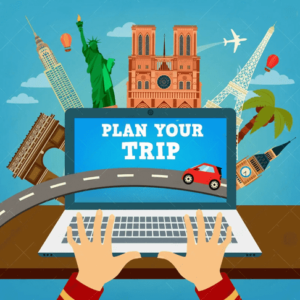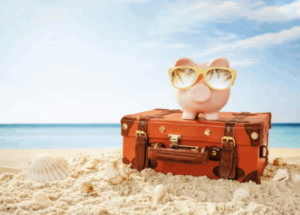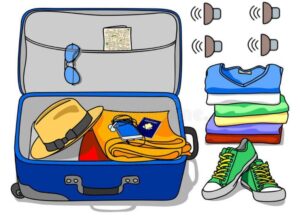
Traveling the world doesn’t have to be a luxury reserved for the wealthy. With the right strategies and a little creativity, you can embark on exciting adventures without draining your savings. Whether you’re a seasoned traveler or planning your first trip, these essential travel hacks will help you explore more while spending less.
1. Smart Planning and Booking

Long before you board a bus or aero plane, there’s one of the biggest chances to reduce the cost of your trip. The way you reserve and arrange your travel might significantly affect how much it ends up costing.
- Be Adjustable with Dates: Finding the finest airfare and lodging prices requires being adaptable. You can save a lot of money by travelling during off-peak times, including shoulder seasons, which are the transitional months between high and low season. Not only are hotels and airfares less expensive, but there is less crowding at tourist sites, making for a more pleasurable experience. In a similar vein, flights are frequently less expensive throughout the week—on Tuesdays and Wednesdays—than during the weekends.
- Use Fare Alerts and Comparison Websites: For travelers on a tight budget, resources like Google Flights, Sky scanner, and Kayak are priceless. By comparing costs from several airlines, these services let you identify the most economical choices. You may make reservations at the best possible time by setting up fare alerts, which guarantee you’ll be informed when prices drop.
- Plan Ahead or Wait Until the Last Minute: Generally speaking, securing cheaper airfare and hotel rates requires making reservations many months in advance. On the other hand, last-minute offers, particularly for hotels and holiday packages, can also result in significant discounts if you’re flexible and impulsive.
2. Affordable Accommodations

Accommodations can quickly become one of the largest expenses on any trip, but there are plenty of ways to cut these costs without sacrificing comfort.
- Stay in Hostels or Guesthouses: Hostels are a traditional low-cost travel option that provide an opportunity to meet other travelers and inexpensive accommodation. For individuals who would like have more privacy, several hostels also have private rooms. In less popular locations, guesthouses and bed & breakfasts may also be less expensive options to hotels.
- Think About Alternative Lodging: Websites like Airbnb, VRBO, and others provide a variety of choices, from renting a room in someone’s house to renting full flats or houses. These choices are frequently less expensive than hotels, particularly when travelling in a group or for extended periods. Furthermore, Couchsurfing provides free lodging in nearby houses; nonetheless, the platform emphasizes cross-cultural exchange over cost savings.
- Seek for Inexpensive or Free Lodging: You can stay in cozy homes for free by house-sitting or participating in house exchanges. Travelers can find homeowners who need someone to look after their house and pets while they’re gone. Similar to this, house exchange programs let you trade residences with people around the globe, offering a distinctive and affordable way to stay.
3. Cost-Effective Transportation

Getting from point A to point B can be expensive, but with a few strategies, you can significantly reduce your transportation costs.
- Use Public Transportation: Make use of the community’s public transportation system rather than hailing a cab or renting a car. In addition to being less expensive, buses, trains, and metros offer you a more genuine sense of the location you’re visiting. Purchasing a day pass or multi-day transit card can grant unrestricted travel in numerous places at a far lower price than purchasing individual tickets.
- Walk or Cycle: Not only is it more affordable to explore the city on foot or by bicycle, but it also gives you a fresh viewpoint. Free walking tours are available in many cities, with local guides showing you the sights in return for a tip. Additionally, several locations provide affordable bike-sharing options, making it possible to travel further without using public transportation.
- Carpooling and Budget Airlines: Low-cost airlines provide flights in a variety of locations at reasonable prices. If you travel light and don’t mind a basic experience, these airlines can be a terrific choice, even if they frequently charge extra for services like checked luggage and seat preference. Carpooling services can be a fun and affordable method to travel between cities on longer road excursions.
4. Eating and Drinking on a Budget

Food is another area where expenses can add up quickly, especially if you eat out for every meal. However, with some planning, you can enjoy delicious food without overspending.
- Eat Like a Local: Look for eateries frequented by locals instead of tourist traps, which can have exorbitant costs. In addition to being less expensive, street food is frequently more genuine and tasty. Another excellent choice are food markets, which provide reasonably priced cooked meals and fresh, local vegetables.
- Self-Catering: If your lodging has a kitchen, you might want to cook a few meals for yourself. You can save a lot of money by preparing a few meals and shopping at your local markets or grocery stores, especially in nations where eating out is pricey. Creating basic breakfasts and snacks can also help cut expenses.
- Benefit from Complimentary Breakfasts: A lot of lodging establishments such as hotels, hostels, and guesthouses charge for breakfast. You can reduce the amount of money you spend on food throughout the day by eating well in the morning. You can further save your daily spending by taking advantage of the all-day coffee, tea, or snacks that some lodgings offer.
5. Saving on Sightseeing and Activities

Sightseeing is often the highlight of any trip, but the costs can add up quickly if you’re not careful. Fortunately, there are plenty of ways to enjoy your destination’s attractions without overspending.
- Free Walking Tours and Attractions: Free walking tours guided by informed local guides are available in many towns. Tips are the only form of payment for these tours, so you can pay what you can. Additionally, make sure to schedule your visit around the free admission periods that many museums, galleries, and historical sites provide.
- Use City Passes: If you intend to visit a number of locations, you might want to think about getting a city pass. These passes frequently include benefits like bypassing lines and cheap or free admission to a number of well-known locations. Even while they cost money up front, if you want to visit multiple attractions, they can end up saving you money over time.
- Discover Nature: Free travel offers perhaps the best vacation experiences. Engaging in free activities such as hiking, beach excursions, and touring public parks or nature reserves enables you to fully appreciate the natural splendor of your location. Compared to paid attractions, these encounters offer a more profound feeling of location and are frequently the most fulfilling and unforgettable.
6. Money-Saving Tips

Keeping track of your spending while traveling is crucial to staying within your budget. Here are a few tips to help you manage your money on the road.
- Use a No-Fee Travel Credit Card: When using your credit card overseas, foreign transaction fees can mount up rapidly. Choose a credit card that is ideal for travelling that has no foreign transaction fees, travel rewards, and extra benefits like access to airport lounges or travel insurance.
- Avoid Exchanging Money at Airports: Airport exchange desks frequently provide expensive fees and bad conversion rates. For better deals, take out local cash from an ATM or exchange money at a nearby bank. Certain credit cards are an excellent choice for regular purchases since they provide reasonable exchange rates without any extra costs.
7. Packing Smart

Packing light is not just about convenience—it can also save you money and stress during your travels.
- Pack light: Especially on low-cost airlines, bringing just a carry-on bag can help you save money on checked baggage fees. It also relieves you of the strain of carrying bulky luggage, making it simpler to move about airports, public transportation, and lodgings.
- Bring Reusable things: You may cut costs and waste by bringing reusable things on your travels, such as a shopping bag, water bottle, and cutlery. You can save money on plastic bags and utensils by bringing your own shopping bag, and many locations provide free water refill stations.
Traveling on a budget doesn’t mean missing out on amazing experiences. By planning ahead, making smart choices, and being flexible, you can explore the world without breaking the bank. These essential travel hacks will help you maximize your travel experiences while keeping your finances in check. So go ahead, start planning your next adventure, and remember: the journey is just as important as the destination.
Happy travels!